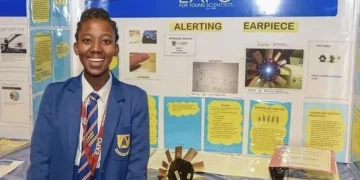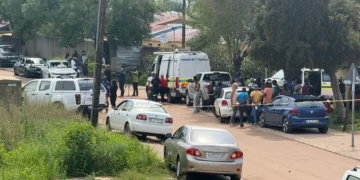What is Operation Dudula?
Operation Dudula is a South African anti-immigrant vigilante movement that emerged from Soweto in 2021 and later registered to contest elections as a political party. Its name means “to push back/force out” in isiZulu. The group blames undocumented migration for crime, pressure on public services, and unemployment, and has organised actions to “enforce” immigration and labour rules—often outside the law—by confronting traders, raiding homes or boarding houses, and attempting to block migrants from clinics and schools. Civil society organisations, independent media, and human-rights bodies widely characterise the movement as xenophobic and vigilante in nature; the group denies this and describes itself as “patriotic.” (Wikipedia, Al Jazeera, The Washington Post, Facebook)
When did it start?
The movement coalesced after the July 2021 unrest, when founder Nhlanhla “Lux” Dlamini gained public attention for claiming to have helped protect Maponya Mall in Soweto. One of the first high-profile marches took place on 16 June 2021 (Youth Day), with subsequent expansions to other provinces through 2022. In 2023 the movement announced its intention to run in the 2024 elections; litigation shows it later faced disqualification issues for the National Assembly ballot on technical grounds. (Wikipedia, Al Jazeera, SAFLII)
Where does it operate?
Operation Dudula began in Soweto (Johannesburg) and spread into Gauteng’s inner city (including Dobsonville, Jeppe, and Hillbrow), as well as KwaZulu-Natal and the Western Cape. Actions have included marches, shop inspections, building raids, and attempts to restrict access to public clinics in central Johannesburg. (Wikipedia, GroundUp News)
How did it operate—tactics and flashpoints
- Clinic blockades & service denial: Members have repeatedly attempted to turn undocumented patients away from facilities such as Jeppe Clinic; journalists and rights groups documented harassment and intimidation at health-care gates. The group and its affiliates have also threatened school access campaigns. Authorities and rights groups stress that such conduct is unlawful and violates constitutional and statutory obligations. (GroundUp News, seri-sa.org, sihma.org.za)
- Raids & confrontations: In March 2022, Dlamini was arrested for a Dobsonville house raid; in August 2023 he received wholly suspended sentences arising from that incident. (Africanews, News24)
- Diepsloot killing of Elvis Nyathi (April 2022): Amid heightened anti-immigrant tensions in Diepsloot, a Zimbabwean man, Elvis Nyathi, was beaten and burned to death by a mob after demands to produce identity documents. Regional and international bodies condemned the killing as extrajudicial; while not all participants were formally linked to Dudula, the incident epitomised the lethal environment surrounding anti-migrant vigilantism. (achpr.au.int, Amnesty International, cabc.org.za)
- Public rhetoric vs. official response: President Cyril Ramaphosa publicly condemned “vigilante-type” actions against foreigners in April 2022, reiterating that immigration enforcement must occur within the law. Operation Dudula leaders, in turn, have framed their campaign as a lawful community defence. (The Washington Post, Facebook)
Legal and institutional pushback
- High Court case (June 2025): A coalition of civil-society groups—Kopanang Africa Against Xenophobia (KAAX), South African Informal Traders Forum, Inner-City Federation, and Abahlali baseMjondolo—brought a landmark case against Operation Dudula and state organs, seeking interdicts to stop harassment, hate speech, document-checking, and interference with access to schools and clinics. The South African Human Rights Commission (SAHRC), Section27, and the International Commission of Jurists (ICJ) intervened. Part A earlier protected applicants’ identities; Part B was heard on 10–11 June 2025. (seri-sa.org, sahrc.org.za, International Commission of Jurists, dailymaverick.co.za)
- Election participation: Operation Dudula registered as a political party in 2023 to contest the 2024 polls; subsequent litigation indicates it failed to meet certain ballot requirements at national level in 2024. (Local/provincial participation and results vary by ballot and are detailed in IEC reports.) (The Guardian, SAFLII, Election Results South Africa)
Why did it gain traction?
Three reinforcing dynamics helped the movement grow:
- Socio-economic stress: Persistent unemployment, inequality, and service failures provided fertile ground for scapegoating migrants, particularly other Africans.
- Perceptions of weak border/immigration enforcement: Dudula’s narrative of “citizens enforcing the law” resonated with communities frustrated by crime and failing municipal enforcement. (Wikipedia)
- Online mobilisation: Researchers documented online narratives amplifying fear and hostility during crises (e.g., after Nyathi’s murder), helping the movement coordinate actions. (cabc.org.za)
What has changed since 2023–2025?
- Politicisation: Transition from street movement to political party broadened visibility but also subjected Dudula to electoral rules and court scrutiny. (The Guardian)
- Rights-based counter-mobilisation: The 2025 High Court proceedings consolidate years of advocacy to legally restrain vigilante actions and compel state protection for migrants’ rights. International bodies (ICJ; UN CERD experts) have urged South Africa to curb xenophobic violence and ensure access to services regardless of status. (International Commission of Jurists, OHCHR)
- Leadership shifts: Dlamini distanced himself from the organisation in mid-2022, while other figures and structures persisted. Sentencing outcomes from earlier raids underscored personal legal exposure for leaders. (Wikipedia, News24)
Future implications to watch
- Court orders and policing practice: Depending on the High Court’s eventual rulings, authorities may be compelled to proactively prevent service-denial actions at clinics and schools, and to act against identity-document “spot checks” by private actors. Compliance (or lack thereof) will shape real-world outcomes. (seri-sa.org)
- Health and education access: Continued attempts to block migrants’ access to clinics or classrooms would contravene constitutional guarantees and established jurisprudence; any organised campaigns on this front may trigger urgent interdicts and criminal liability. (seri-sa.org, GroundUp News)
- Political incentives: Even with limited ballot success, anti-immigrant rhetoric can influence larger parties’ agendas in coalition settings, potentially tightening local by-laws and enforcement practices in ways that disproportionately affect informal traders and cross-border migrants. (The Guardian)
- Risk of violence: Periods of economic stress and inflammatory messaging correlate with spikes in xenophobic attacks. Robust messaging from national leadership, clear policing protocols, and rapid prosecution of intimidation and assault remain critical to preventing future atrocities like the Nyathi killing. (Amnesty International, The Washington Post)
What readers should know (significant takeaways)
- Illegality of “citizen immigration enforcement”: Demanding documents, searching homes/shops, blocking hospital gates, or threatening traders is unlawful. Only state officials may enforce immigration and labour statutes, and they must do so within constitutional limits. Ongoing litigation seeks to make this crystal clear and enforceable. (seri-sa.org)
- Rights apply irrespective of nationality: Access to basic education for children and emergency/essential health care is protected; blanket denial based on immigration status is unconstitutional and violates international obligations. (seri-sa.org)
- Narratives matter: Online campaigns that dehumanise migrants have offline consequences. Media literacy and community-level conflict mediation are part of the prevention toolbox. (cabc.org.za)
- State accountability: Rights groups are not only suing vigilantes; they are also asking courts to compel police, Home Affairs, Health, Basic Education and provincial MECs to do their jobs—protecting everyone and preventing discrimination. (seri-sa.org, sahrc.org.za)
Sources
- Al Jazeera explainer: What is Operation Dudula?
- GroundUp: Dudula chases immigrants away from Joburg clinic
- Washington Post: Ramaphosa condemns vigilante-type actions
- Amnesty International: Migrants living in constant fear after deadly attacks
- African Commission on Human and Peoples’ Rights: Elvis Nyathi killing statement
- CABC: The Diepsloot 7 report (online narrative analysis)
- The Guardian: Operation Dudula registers as a political party
- SAFLII: Operation Dudula v Electoral Commission (2024)
- SAHRC: Media statement on KAAX v Operation Dudula (June 2025)
- SERI: High Court to hear KAAX v Operation Dudula (press statement)
- SERI case page: KAAX & Others v Operation Dudula & Others
- International Commission of Jurists: Statement on the case
- GroundUp Q&A: What to do if denied health care by Dudula
- News24: Dlamini gets suspended sentences for 2022 raid
- Wikipedia: Operation Dudula (overview; cross-check with primary sources)
- IEC: 2024 election results report (PDF)
- Al Jazeera: New wave of xenophobia























